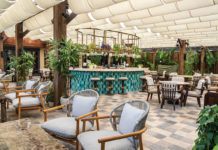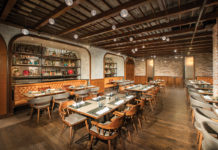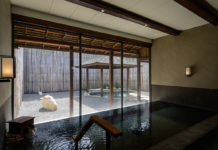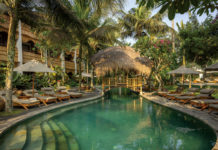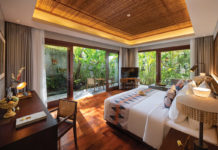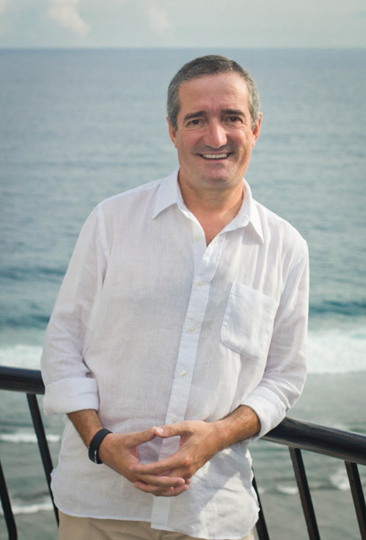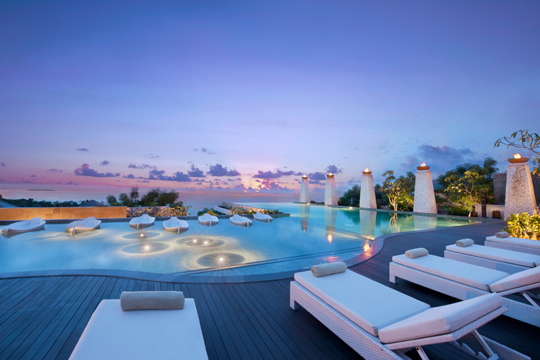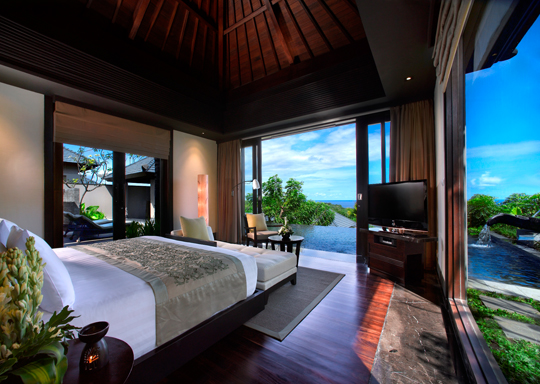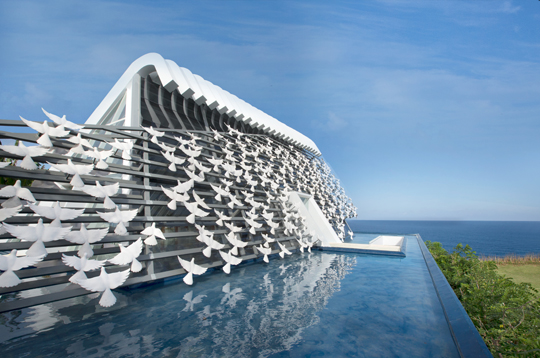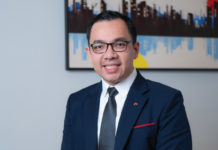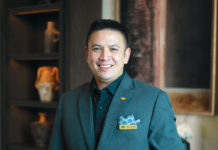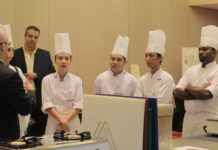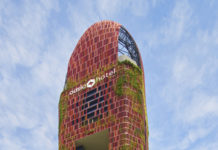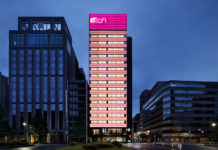As general manager of Banyan Tree Ungasan Bali, a luxurious villa resort on Bali’s southern cliff-tops, Spaniard Alfonso Romero brings with him more than 25 years of hospitality experience working in five-star hotels across Europe and Asia.
An established figure within Banyan Tree Hotels & Resorts and the Meliá Hotel Group, Romero worked his way up the hospitality ladder from pool boy to positions including area vice-president and area general manager and has been a team player in pre-opening and crisis management situations. Throughout his illustrious career and his taste for the luxury life, wherever he finds himself, this consummate yet amiable professional has continually pursued charitable interests and given back to the community. He’s been recognised with such professional accolades as the “Civil Merit Cross Award” awarded by King Juan Carlos I of Spain and the “Maître Hotelier” Award of Appreciation from the Chaîne des Rôtisseurs.
Q: Returning to Bali for the third time, are you happy to be back?
A: My first time working on this premier holiday destination was between 1996 and 1998 at the Melia Bali Hotel and the Melia Benoa Hotel, returning for a second time to the former, from 2004 to 2007. Late 2014, I returned again, this time as general manager for Banyan Tree Ungasan – each of these moves was predicted by a Balinese Hindu priest! Yes, it’s a real pleasure to be back on this magical island, especially coming straight from China as interim general manager of Angsana Fuxian Lake, Chengiiang (part of the Banyan Tree Group’s portfolio), China, a complete contrast to Bali and one of the more challenging areas to work in for hospitality.
Q: You have mainly worked with two prominent hotel brands. Why?
A: For Singaporean Banyan Tree Hotels & Resorts, I have also worked as area general manager in China and general manager in Korea for Banyan Tree and Angsana properties and for the Spanish hotel chain Meliá Hotels. Besides Bali, I have held positions as area vice-president and general manager for properties in China, Indonesia, Thailand and Vietnam. Although from different continental origins, Meliá Hotels and Banyan Tree are surprisingly similar in corporate principles and share my core values. Both hotel groups are open-minded and community and environmentally committed, with an underlying sustainability ethos and “give back” focus to the local community’s disadvantaged – especially children. I particularly like Banyan Trees’ blend of luxury travel with a green and sustainable conscience and the Spanish-owned Meliá reflecting our Spanish culture of friendliness, sociability and family-orientation. By coincidence, both Banyan Tree Ungasan and Melia Bali hotels are owned by the same Indonesian owner – we have worked together for years.
Q: Tell us about your humanitarian award from Vietnam.
A: I worked as general manager for Meliá Hanoi in Vietnam’s capital city, Hanoi, from 2000 to 2004 – a particularly special time for me. As part of the Meliá Hotels’ “give back’’ commitment, Meliá Hanoi organised a special programme to help local underprivileged children, including by donating excess hotel buffet food, arranging educational needs such as books and scholarships and organising fund-raising charity events. From these local charitable deeds, I was proud to be awarded a medal for the “Cause of Protection and Care of Children” from the Socialist Republic of Vietnam’s Government Ministry and chairman of the Vietnam Commission for Population, Family and Children.
Q: How does Banyan Tree Ungasan cater to families?
A: Our family market is less than 30% and seasonal, peaking with school holidays and long public weekends. Australians are a major market year-round, as well as Asian, Indonesian and European guests. Children tend to love the spaciousness of our 73 individual villas and their generously sized private infinity pools and outdoor Jacuzzis. We also provide a Kids Club for children aged 4 to 10, with activities focusing on creative learning, plus special kids’ activities – including down on our private beach – and children’s books and DVDs. Our Banyan Tree “Sense of Fun” family package is created for quality, bonding time for all the family, contributing to long-lasting memories.
Q: How does the resort give back to the community and staff?
A: Several times a year, Banyan Tree Ungasan organises staff family parties and family excursions. Staff families are offered employment benefits including an in-house doctor, while management families are well supported with benefits such as for children’s education. Many of our staff of around 150 have worked long-term and all are happy to work here. Every few months, the resort organizes beach clean-ups, plus tree planting in the local Ungasan area – a Banyan Tree signature – aiming to plant 2,000 trees a year, besides visiting hospitals and arranging sponsorships.
Q: Has your family background influenced you and your chosen life path?
A: Yes and no! I come from Marbella, in Spain’s southern Andalusian region, and a traditional Catholic family. My mother wanted me to stay in Marbella like my siblings, but I was different from the others and left Spain two decades ago to work abroad. My father, however, a diligent businessman, instilled in me the importance of hard work and responsibility and taking care of people and property. As a holiday destination, Marbella is similar to Bali: I got my first taste for hotels working in Puente Romano, one of Marbella’s most luxurious resorts, as pool boy and waiter, cementing my career path with hospitality positions in Lanzarote – part of Spain’s Canary Islands, but to my mother another planet! I go back to Spain every year, but my mother still hasn’t visited Bali; she doesn’t like traveling or different cultures – unlike me!


